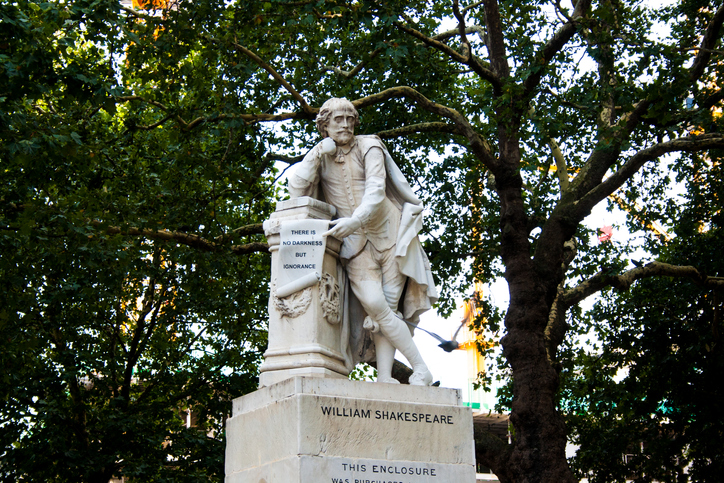The Great Author of America

Happy birthday to Shakespeare, the national poet of the world.
I sit with Shakespeare and he winces not. Across the color line I move arm in arm with Balzac and Dumas, where smiling men and welcoming women glide in gilded halls. From out the caves of evening that swing between the strong-limbed earth and the tracery of the stars, I summon Aristotle and Aurelius and what soul I will, and they come all graciously with no scorn nor condescension. So, wed with Truth, I dwell above the Veil.
W.E.B. Du Bois, The Souls of Black Folk
William Shakespeare was baptized on April 26, 1564. Because of this, his birthdate has traditionally been celebrated on April 23, the feast day of St. George, patron saint of England, which also happens to be the date on which he died, in 1616, fifty-two years later. But—in these dark days when English majors can graduate from formerly reputable American universities having never studied Shakespeare—any excuse is a good one for remembering America’s greatest poet.
Cast your mind back to Amherst, Massachusetts in March 1879. There, an Amherst College senior attended a lecture in College Hall by Ralph Waldo Emerson. The senior, Henry Clay Folger, was inspired by the lecture to read more Emerson, including a short speech Emerson had delivered in 1864 on the tercentenary of Shakespeare’s birth. This reading inspired Folger with a lifelong interest in Shakespeare. Folger went on to become president and chairman of the board of the Standard Oil Company of New York and to marry Emily Clara Jordan (who became Emily Jordan Folger). Together they studied and collected Shakespeare for the rest of their lives and conceived and provided for the creation of the Folger Shakespeare Library in Washington, D.C., regarded by informed Shakespeareans as “the finest Shakespeare collection in the world.”
Some lecture. . . . It is an example of the unpredictable and unscriptable way education—teaching and learning—occurs. The teacher presumably has something worthwhile to say, but he can’t and doesn’t know or say it all. There is always more to say and to learn. Maybe some of it has been written down somewhere. The student has his own capacities and inclinations and has to come ready—looking for something important. If you seek, you shall find; but you never know just what you will find or you wouldn’t be seeking. Nor do you know exactly how you will find it, or what the consequences will be. But “all men,” as Aristotle says, “by nature desire to know,” and nature does nothing in vain.
A former classmate claimed that Emerson knew “almost all of Shakespeare by heart” by the time he arrived at Harvard College. Whatever young Emerson knew by heart, he took to heart enough to conclude, in the speech Henry Folger read, that Shakespeare was “the first poet of the world,” that he “fulfilled the famous prophecy of Socrates, that the poet most excellent in tragedy would be most excellent in comedy,” and that he is “the most robust and potent thinker that ever was.” Emerson was registering a judgment similar to that rendered generations earlier by the English poet John Dryden, who wrote of Shakespeare that he was “the man who of all modern and perhaps ancient poets had the largest and most comprehensive soul.”
Such a judgment was common among educated, and even uneducated, Americans from the earliest days of American independence. Thomas Jefferson thought that “a lively and lasting sense of filial duty is more effectually impressed on the mind of a son or daughter by reading King Lear, than by all the dry volumes of ethics, and divinity that were ever written.” John Adams’ diary entry on a Sunday in February 1772 expressed a typical view, regarding Shakespeare as “that great master of every affection of the heart and every sentiment of the mind.” Because Shakespeare was a great master of every human affection and sentiment, he was as Adams later wrote in his Discourses on Davila, a “great teacher of morality and politics.”
The judgments Jefferson and Adams made about Shakespeare were rooted in the same understanding of nature and human nature that inspired and shaped the American Revolution. In the divine or natural order of which human beings are a part, it is possible to discern some things that are more beautiful or noble than others, some things more or less just, more or less admirable. In light of such distinctions ascertainable by reason and common sense, one might recognize Richard III as a tyrant and George Washington as a great souled man. The capacity of men to make such distinctions justified a decent respect for the opinions of mankind and was the necessary condition of self-government.
Animated by such an understanding, generations of Americans picked up Shakespeare eagerly to read him, or went eagerly to his plays, in hopes of finding, not just sublime and earthy enjoyment—which they found in abundance—but great treasures from which they might benefit: insights into the things that mattered most to them in the world. Because it became so characteristic of Americans to approach Shakespeare in this spirit, he could be to any who sought him out something like what he was to W.E.B. Du Bois, and he paradoxically became what James Fenimore Cooper called him, “the great author of America.”
The American Mind presents a range of perspectives. Views are writers’ own and do not necessarily represent those of The Claremont Institute.
The American Mind is a publication of the Claremont Institute, a non-profit 501(c)(3) organization, dedicated to restoring the principles of the American Founding to their rightful, preeminent authority in our national life. Interested in supporting our work? Gifts to the Claremont Institute are tax-deductible.
